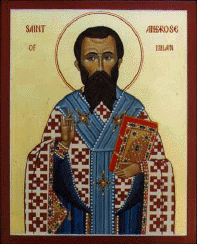Ambrose of Milan
7 December 397
 Ambrose was governor of Northern Italy, with capital at Milan. When the see of Milan
fell vacant, it seemed likely that rioting would result, since the city was evenly
divided between Arians and Athanasians. (Note: Athanasians affirm that the Logos or
Word (John 1:1) is fully God in the same sense that the Father is, while Arians
affirm that the Logos is a creature, the first being created by the Father.) Ambrose
went to the meeting where the election was to take place, and appealed to the crowd
for order and good will on both sides. He ended up being elected bishop with the
support of both sides.
Ambrose was governor of Northern Italy, with capital at Milan. When the see of Milan
fell vacant, it seemed likely that rioting would result, since the city was evenly
divided between Arians and Athanasians. (Note: Athanasians affirm that the Logos or
Word (John 1:1) is fully God in the same sense that the Father is, while Arians
affirm that the Logos is a creature, the first being created by the Father.) Ambrose
went to the meeting where the election was to take place, and appealed to the crowd
for order and good will on both sides. He ended up being elected bishop with the
support of both sides.
He gave away his wealth, and lived in simplicity. By his preaching, he converted the diocese to the Athanasian position. On one occasion, the Empress ordered him to turn over a church to the Arians so that Arian Gothic soldiers could worship in it. Ambrose refused, and he and his people occupied the church. Ambrose composed Latin hymns in the rhythm of "Praise God from Whom all blessings flow," and taught them to the people, who sang them in the church as the soldiers surrounded it. The Goths were unwilling to attack a hymn-singing congregation, and Ambrose won that dispute.
He subsequently won another dispute, when the Emperor, enraged by a crowd who defied him, ordered them all killed by his soldiers. When he next appeared at church, Ambrose met him at the door and said, "You may not come in. There is blood on your hands." The emperor finally agreed to do public penance and to promise that thereafter he would never carry out a sentence of death without a forty-day delay after pronouncing it.
Ambrose was largely responsible for the conversion of St. Augustine. The hymn Te Deum Laudamus ("We praise Thee, O God") was long thought to have been composed by Ambrose in thanksgiving for that conversion. The current opinion is that Ambrose did not write it, but that he may well have written the Creed known as the Athanasian Creed, now widely accepted by Christians. He is perhaps the first writer of Christian hymns with rhyme and (accentual) meter, and northern Italy still uses his style of plainchant, known as Ambrosian chant, rather than the more widespread Gregorian chant
Ambrose is regarded as one of the Eight Great Doctors (Teachers) of the Undivided Church. The list includes four Latin (Western) Doctors (Ambrose, Jerome, Augustine, and Pope Gregory the Great), and four Greek (Eastern) Doctors (Athanasius, John Chrysostom, Basil the Great, and Gregory of Nazianzus -- not to be confused with Gregory of Nyssa, the brother of Basil).
Text adapted from James Kiefer's Christian Biographies
Image from Convent
of Saint Elizabeth (no longer available)